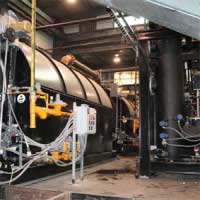What I posted was the plastic drying equipment used by the plastic recycling industry who, of course, deals with wet plastic because they WASH their plastic. Plastic recyclers will pay good money for plastic then selling the recycled plastic flakes a tiny margin higher than they paid, proving everything they do to recycle plastic must be quite cheap, including drying it (if it needed to be).
That said, I don't know if the plastic drying equipment can be used on raggertail. I don't think it has to either. "Moisture" as you put it is not a problem. Refineries can tolerate up to 4% water in the oil. More than that, it needs dehydration.
It's not that the P2O processors can't tolerate water -- it's that they can't tolerate large quantities of water. Just like anything else involving high heat.
I suspect the reason for large quantities was that it froze and turned to ice instead of evaporating, which is why they never ran into this problem until January 2013. Notice in January 2013 they had huge variance in temperature:
http://weather-warehouse.com/WeatherHistory/P...nuary.html
Rains heavy one day when temperatures are above freezing then an over night big chill....and your large quantities of rain turn to ice. Who was the dumb ass who fed ice filled feedstock into the processors? Maybe it wasn't obvious that ice was filled underneath and inbetween the cracks in the grandular, flakey feedstock.

